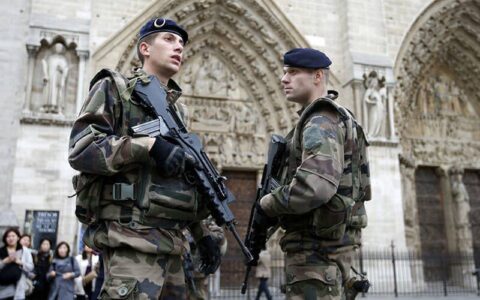
Why France and Germany need to tackle terrorism together?
The frequent terror attacks in Western Europe in 2016 highlights the power of “lone wolf” actors. The influx of refugees continues to haunt intelligence and security agencies. Today, as the situation has worsened, the two preferred targets, France and Germany, are focused on drafting extensive domestic and external security mechanisms.
The repetitive terror attacks in France and Germany have impacted French and German communities. French communities believe that violence should be met with violence. German communities have largely deliberated on Merkel’s asylum policy and the systematic sharing of responsibilities with other EU member nations particularly with respect to the distribution of refugees in Europe. However, even today, the much-needed discussion between French and German communities remains absent due to different priorities and established policy mechanisms.
Targeted by terror factions and shocked by the strike on Charlie Hebdo in 2015, France has dedicated all available resources to countering the threat of militant Islamic fundamentalism, while re-routing all essential “strategic and military” resources to reinforce its fight against terrorism in the Middle East and North Africa. By comparison, Germany is largely focused on strategic and clandestine operations, whereas its military is extensively used to eliminate selected “high value targets” often playing the supporting roles to intelligence agencies.
The refugee policies of Germany and France follow “different” approaches. Berlin considers the “humanitarian” needs in its refugee policy and considers refugees to be victims not a threat, As a result Germany has opened its doors to the asylum seekers.France extended the refugee settlement but the frequent attacks in Europe coupled with Charlie Hebdo attack, led to aggressive public debates. Today, the two nations continue to carry out policies and in spite of the established mechanisms, they remain vulnerable to terror attacks. In an effort to counter terror attacks particularly those carried out by asylum seekers, the cooperation between the two nations is absolutely necessary.
To effectively counter the terror threat, it is imperative for policymakers in France and Germany to draft policies of common “cooperation and coordination” and reinforce these policies with strategic and security mechanisms. One “effective” way to prevent the incursion of terrorists is to enhance inter and intra-agency cooperation and coordination between law enforcement and intelligence agencies, particularly those that deal with clandestine services and the judiciaries.
Policies must focus on the Schengen area, draft a common policy, engage in productive dialogue and reinforce the policy with necessary strategic and security resources and then submit their draft policy to the European Union. Moreover, political leadership of Germany and France must engage in frequent “joint-discussions” and multilateral dialogues to identify effective political responses to prevent radicalization in their communities by countering Islamic fundamentalism, apprehending Wahhabi preachers and develop dialog among the Muslim communities along with studying previous militant attacks in an effort to understand behavioral habits of “lone wolves.”
French and German political leadership must agree on their responses to combat terror factions in the Middle East and the Sahel and understand that clandestine operations will only be successful when reinforced with human intelligence supported by support on the ground. Germany must deploy boots on the ground. The German Parliament needs to play a proactive role by “supervising” such tactical preparations.
In light of already established security mechanism ratified by the European Union, it is imperative for Paris and Berlin to combine their security mechanisms while further reinforcing the already established security policies designed by the European Union while still opening the doors to refugees. With such “complexity,” policymakers must implement a coordinated policy which will be effective in countering future issues.
The participation from the European Union is also needed. The cooperation between EU member nations under the umbrella of “security and defence” is vital. In the light of Franco-German “cooperation and coordination policy,” Berlin and Paris must ensure that the EU plays an “active” role in designated initiatives. In the light of Brexit and President Trump’s “unpredictable” foreign policies in Europe, France and Germany must relocate adequate resources to reinforce the EU’s Common Security and Defence Policy to ensure that the EU is pro-active in the face of future attacks.
Policymakers should also deliberate on common defence budgets while strengthening the force structure of NATO and draft policies to reinforce effective “cooperation and coordination” between civilians and the military. To resolve the complexities the EU will need all available resources.
Berlin and Paris must invite necessary actors to strengthen the European Union’s Neighbourhood Policy which was last reformed in 2015 and ensure that policies are implemented, and continue to adapt changes.
The continuous threat posed by Islamic fundamentalism and the impending refugee crisis in Europe have put pressure on the European Union as a whole. Franco-German relations would test the EU’s political will of member nations to cooperate and coordinate with each other both at intra-government and intra-community levels.
The fear of rising right wing populism and anti-EU propaganda continue to haunt member nations particularly when populist “elected” leaders have initiated policies to turn inward. If France and Germany take adequate steps to assist each other, the extent of cooperation would not only be limited to the two nations but the positive approaches and successful results would encourage member nations to re-think their approaches, further strengthening the EU.
Source: International Policy Digest





